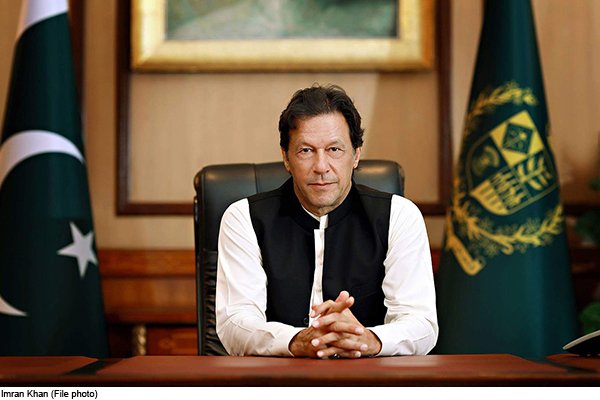New Delhi: In an op-ed for Pakistani daily The Express Tribune on Monday, Pakistan Prime Minister Imran Khan said the most pressing challenge facing his country is the struggle to establish the rule of law. He also alleged that the “apartheid rule of law” has led to poverty and extremism in India.

“The most important of all the challenges facing our country right now is the struggle to establish the rule of law. In the last 75 years of Pakistan’s history, our country has been afflicted by elite occupation, where powerful and devious politicians, cartels and mafia have become accustomed to being above the law to protect their privileges gained through corrupt systems. They have corrupted the state institutions while protecting their privileges,” he wrote.
Khan said that Pakistan should adopt the five guiding principles of the State of Medina (i.e. the Islamic version of a welfare state) created by Prophet Muhammad: unity, rule of law, strong moral and ethical foundations, inclusivity and the pursuit of knowledge.
He also emphasized that the National Rahmatul-Lil-Alamin Authority (NRA) – a body of scholars formed last October and tasked with finding ways to disseminate lessons from the Prophet’s life to the public – in relation to a will play an important role. Third Principle: Strong moral and ethical foundations.
He wrote, “The NRA will endeavor to join Amar Bil Maroof by teaching Seerat-al-Nabi (SAW) to our youth in schools and universities in hopes of raising the level of ethics and morality in our society.”
Amar Bill Maruf refers to encouraging people to do good, and Seerat-al-Nabi refers to the biography of the Prophet.
India’s ‘apartheid rule of law’
Khan claimed that the most successful states have the most “robust application” of the rule of law, citing Japan, China, South Korea and Western countries as opposed to India, Pakistan and countries in Africa and Latin America.
“In many countries of the Muslim world, despite the vastness of tremendous resources, little progress has been made, which is due to the lack of rule of law…the union of their country,” he wrote.
“In Pakistan, billions of US dollars have been embezzled due to non-compliance with the rule of law, which has imposed collective poverty on our people. This is the pattern of politics and development in many countries of Africa and Latin America. The so-called Banana Republics are as they are because of their lack of rule of law,” he said.
‘State cannot be neutral in moral development’
Khan emphasized the role of the state in securing “moral development” among the people, a reference to the third principle: strong moral and ethical foundations.
He wrote, “There are elements in our society that believe that the moral development of the people should be left to the people, that the state should remain neutral about good and evil as envisioned by religion.”
“This approach is quite outdated and problematic as it prevents the state from performing its moral and ethical duties and allows the country’s adversaries to come up with a handful of money and our values by using our own educational systems and channels of information. distorts,” he added. ,
The concept of amar-bil-maroof-wa-nahi-anil-munkar (doing good, forbidding evil) is important as the Quran declares it to be a “defined mission for the Ummah”, he added.
Western model of welfare states not ‘possible or desirable’
With regard to the principle of inclusive growth through the creation of the welfare state, Khan offered a caveat: welfare states are “neither possible nor desirable” in line with the West.
“Most Western welfare states were not environmentally sustainable because they were highly consuming societies that generated enormous waste. If all non-Westerns imitate these welfare states, our patterns of production, consumption and waste would be similar to theirs. As it will happen, and by some estimates we will need six more planet Earths to act as sinks that absorb our waste, wrote Khan.
Instead, he suggested that “only moderate prosperity and consumption would be the norm” with universal health care and education.
With regard to the need to create a knowledge-based society, Khan said that people “should not confuse literacy with knowledge”.
He wrote: “Literacy alone may not be enough for a happy society. Knowledge is important with spiritual transformation from cradle to grave.”

